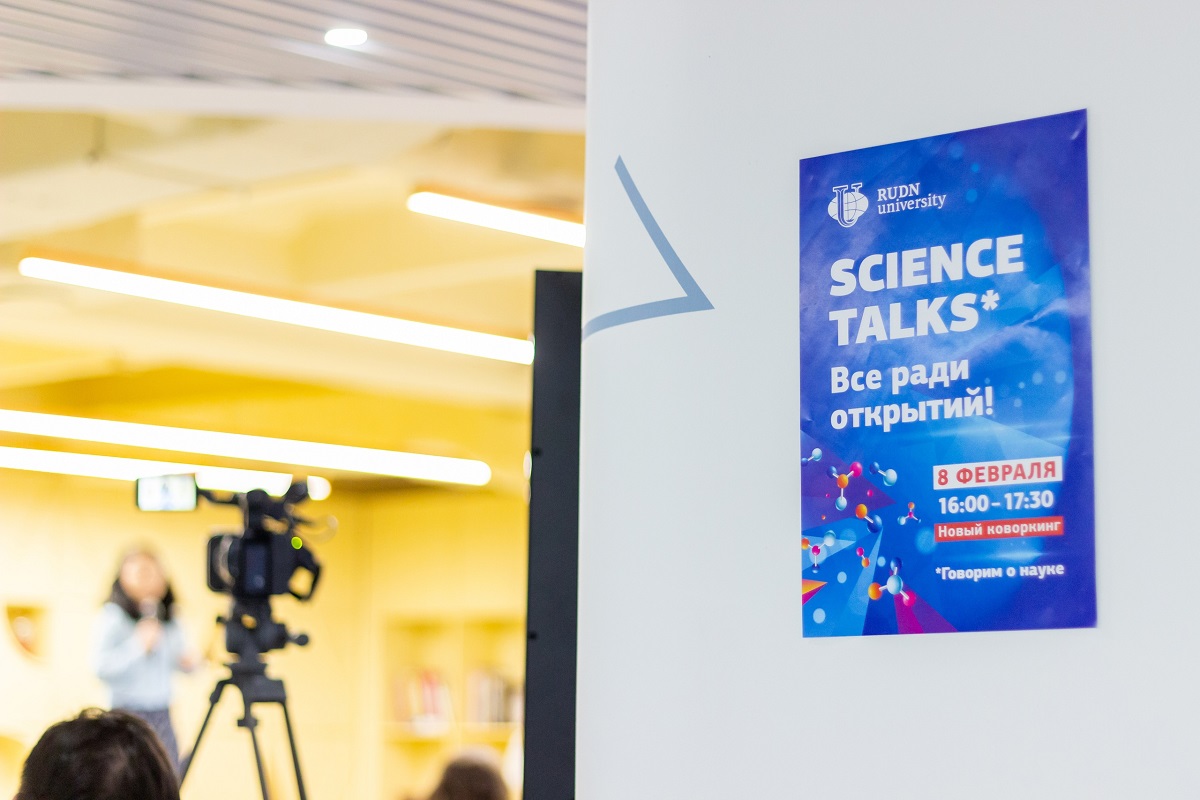All for discoveries! RUDN University hosted Science Talks for the first time

7 young scientists shared how science transforms the surrounding world and makes it better.
RUDN Science Talks is a new format for the popularization of science, when young scientists share stories about discoveries and developments in their scientific interests with the audience in the format of a lecture show. In seven minutes, the participants told how they came to science and what difficulties they faced, explained what gamification, pop-up and why business needs them, why it is necessary to participate in Olympiads not only at school but also at university, and how John Tolkien created an artificial language and why you need to study modern fantasy.
Lecturers at the event were 4 students, a master, a graduate student, and a teacher. Among them are a philologist, mathematician, chemist, linguist, ecologist, hotelier, and tourism manager. The slogan of the first Science Talks at RUDN was “All for discoveries!”
How can a young scientist develop in science?
“If you suddenly can attend a conference, you must go, get to know each other, talk to people. If you do not understand whether it is worth moving further up the scientific ladder, come to the department and ask why people go to graduate school. Communication helps to overcome the threshold of uncertainty. To be a great scientist today is not only to know and be able to do a lot, but also to develop soft skills: to talk and be able to negotiate,” Alexandra Antonova, research laboratory assistant, graduate student, the Department of Organic Chemistry, RUDN University.
How did John Tolkien come up with the Elvish language?
“John Tolkien took components from different languages, put together and got the rules of Elvish. Everything else — sounds, words, means of expression — he invented himself, relying only on harmony and fantasy. After Tolkien developed the language, he created a literary universe where the characters could speak Elvish. It is important to understand this, because a language has no value without its use,” — Maria Podgornaya, 4th year student, the Institute of Foreign Languages, RUDN University.
What is gamification and how is it used in personnel management?
“Gamification is the introduction of gaming technologies into the workflow. It allows you to increase the productivity and motivation of the employee himself. So, in one of the Russian companies they gave the opportunity to offer their ‘game’ project to the head. This reduced the level of layoffs, creating a favorable working atmosphere. Corporate memes have appeared in the team,” — Anastasia Cheburakova, 4th student, the Institute of Hotel Business and Tourism, RUDN University
Why should students participate in the Olympiads?
“The Olympics is an opportunity to challenge yourself and have fun, test yourself. When you solve a difficult problem, you feel magical. When you win a prize — just in seventh heaven with happiness! Olympiads help develop a professional apparatus, improve hard and soft skills: develop accuracy, composure and self-confidence,” — Alexander Kirilenko, research laboratory assistant and fourth-year student of the Faculty of Physics, Mathematics and Natural Sciences, RUDN University.
How does modern fantasy work?
“Modern Russian fantasy is characterized by a playful beginning to the canons originally created by Tolkien. This allows not only to get acquainted with many Russian fantasy works, but also to note their parodic nature. Studying fantasy, in my opinion, is most important due to the philosophical device of deconstruction in works. This is when one thing is disassembled into its component parts, like a constructor, to later assemble the same thing from the same components, but with new meanings,” — Zhamal Maratova, assistant of the Department of Russian and Foreign Literature, Faculty of Philology, RUDN University.
What is a pop-up and why is it needed?
“Pop-up culture has existed for 800 years, and fairs are considered its first examples: each of the merchants sought to attract a buyer, so they tried to make their counter bright and attractive. Pop-ups today are unusual designs at exhibitions or forums that companies use to attract the attention of visitors. This is a format that, with minimal investment, allows small businesses to ‘shoot’ and well-known brands to remind themselves,” Ksenia Golodnaya, second-year student, the Institute of Hotel Business and Tourism, RUDN University
The first RUDN Science Talks achieved its goal. The event was full of discoveries both for the lecturers themselves and for the audience. Science Day is over. Ahead — new ideas and research!
The author — Anastasia Zhuravleva (III year, “Journalism”)
About 150 leading Russian and foreign scientists met at the 7th All-Russian Conference "Physics of Aqueous Solutions" at the Russian Academy of Sciences.